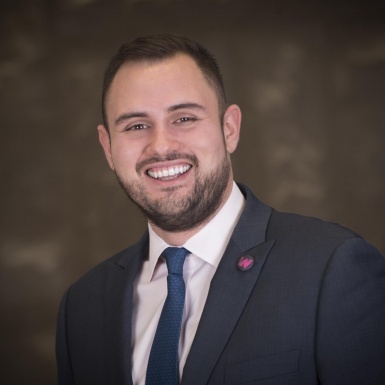Millennial Alzheimer’s Advocate Takes on the New Hampshire Democratic Primary
Sign up and receive information on the latest news and updates.
UsAgainstAlzheimer’s Jason Resendez sat down with Alzheimer’s advocate Norma Bostarr - a member of our partner organization the Youth Movement Against Alzheimer’s - to discuss her experience on the campaign trail in New Hampshire. Norma spent a week asking all the candidates how they will address our nation’s Alzheimer’s challenge. Follow Norma at @NBostarr.
What motivated you to hit the campaign trail in New Hampshire?
To address Alzheimer's, there has been a major focus on research, but research alone isn’t enough. We need to be investing in innovative solutions that will help people now, and I wanted to know what the candidates had in mind.
The Youth Movement Against Alzheimer’s has been seeking more creative and meaningful ways to engage with political leaders. Young people often feel limited and bound to silos of information based on party lines, candidates, or specific ideologies.
In September 2019, we launched a petition to tell our presidential candidates that young people care about the Alzheimer's crisis. In the petition, we asked that bring it up during debates, but for the most part, candidates were too busy trying to outshine one another to discuss the way their economic and health policy addressed the impending crisis.
In October 2019, we brought 50 YMAA members to attend UsAgainstAlzheimer's National Alzheimer Summit in D.C. Together we marched on Capitol Hill to speak to representatives about the CHANGE Act and demand presidential candidates make Alzheimer’s the nation’s top health priority.
But I knew it was critical that we keep up the pressure on policymakers and candidates. Therefore, as a 27-year-old advocate who cares about Alzheimer’s and is curious about politics, I hit the campaign trail. I showed up on their turf in order to build awareness by challenging the traditional image that comes to mind when they hear the word Alzheimer's and to start the conversation where they could tell us in person, in their very own words.
How many candidates did you speak with? Did they say anything that surprised you?
Between Monday, February 3rd and Thursday, February 6th, I spoke with 11 candidates about how they plan to support my generation of millennials and Gen Z’s in the face of the public health crisis being created by Alzheimer’s and dementia: Deval Patrick, Michael Bennet, Pete Buttigieg, Joe Biden, Amy Klobuchar, Bernie Sanders, Bill Weld,Tulsi Gabbard, Tom Steyer, Andrew Yang, and Elizabeth Warren.
While some candidates have specific policies in place that outline how they plan on addressing Alzheimer’s, the majority focused on their larger more well-known policy initiatives as a potential solution. For example, rather than diving into the specifics, Bernie Sanders referred to Medicare for all as a solution that will help address Alzheimer’s.
A few themes that emerged included increasing research funding, supporting caregivers and their ability to provide care while balancing work, and the flaws in the healthcare system related to Alzheimer's treatment and care.
What kind of commitment are you hoping campaigns will make to your generation?
My hope was to increase awareness and get candidates thinking about Alzheimer’s and dementia. Alzheimer’s and dementia are often considered “an old person’s disease,” but I think it’s important we change that narrative. Millennials and Gen Z’s will disproportionately bear the caregiving and financial costs of our aging population. I hope that our dialogue opens up a national conversation.
Did any candidates talk about their personal connection to the disease? Do you think it makes a difference in how they are approaching our nation’s Alzheimer’s challenge?
Yes, several candidates opened up and shared their families' experiences with Alzheimer’s. Deval Patrick and his family cared for his mother in law who had Alzheimer’s for 10 years. Tulsi Gabbard’s shared the heartwrenching memory of the voicemail her grandma left on their families' answering machine to say that she could no longer provide care at home for her grandfather, who had Alzheimer’s anymore. Tom Steyer also shared his first-hand experience with Alzheimer’s and acknowledged that it took the help of the entire family and more in order to provide the care his mother-in-law needed. I also encountered several campaign staffers that had a personal connection to the disease.
